I love games, and have spent most of my life playing them in one form or another. I’ve worked for two game companies and have been involved in development with different hats ranging from manual writer to technical director. So when I was writing United States of Japan, one of my favorite parts was imagining what video games would be like in an alternate history where the Japanese Empire ruled. Speculative works can always push the boundaries, and as early consoles were intertwined with military research, I pushed gaming technology ahead twenty years from where it was in 1988 in our world, considering Japan would no longer need to undergo two decades of reconstruction. One of those changes involved Yakuza-sponsored gaming tournaments where players put everything on the line. Not like Running Man, but more akin to a virtual first person shooter match where the loser loses their life.
Here are five other books that also have games with deadly consequences.
Battle Royale by Koushun Takami
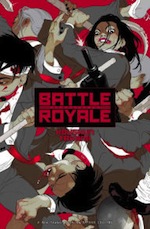 I had no idea what the book by Koushun Takami was about when I first picked it up. I knew there was a movie based on the book and it was a bestseller in Japan. But when a group of classmates in junior high are subjected to sleeping gas and wake up, only to be informed they’ll be taking place in a deathmatch against each other, I was stunned. Metal collars are placed around their necks that will explode if they try to escape, and they’re each given a weapon ranging from guns to worthless items like a fork. Some embrace the violence, like Kazuo Kiriyama who is a sociopath and relishes his chance to take part in the games. Others try to resist, only to be mercilessly slaughtered. I was both enthralled and repulsed, unable to put the book down but wishing it wasn’t disturbing me so much (the extreme violence resulted in the book being condemned by the Japanese National Diet).
I had no idea what the book by Koushun Takami was about when I first picked it up. I knew there was a movie based on the book and it was a bestseller in Japan. But when a group of classmates in junior high are subjected to sleeping gas and wake up, only to be informed they’ll be taking place in a deathmatch against each other, I was stunned. Metal collars are placed around their necks that will explode if they try to escape, and they’re each given a weapon ranging from guns to worthless items like a fork. Some embrace the violence, like Kazuo Kiriyama who is a sociopath and relishes his chance to take part in the games. Others try to resist, only to be mercilessly slaughtered. I was both enthralled and repulsed, unable to put the book down but wishing it wasn’t disturbing me so much (the extreme violence resulted in the book being condemned by the Japanese National Diet).
What’s most chilling is how they start to turn on one another and how that forces you to wonder what you would do in their shoes. Morality is turned upside down and the social commentary is disturbing as you realize everything is being broadcast for the public. It’s as though The Purge were vicariously mixed with something on E!, audiences chowing on sponsored popcorn and soda as analysts commented on the brutality and effectiveness of each killing.
(Note: As much as I enjoyed Running Man and The Hunger Games, I’m leaving them off this list because of the similarities they share with Battle Royale).
The Player of Games by Iain M. Banks
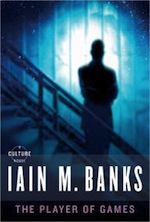 The Player of Games is arguably the most entertaining Culture book and probably the best starting point for those interested in Iain M. Banks’s postscarcity universe. Jernau Morat Gurgeh is a master of games, but he’s bored. It’s not just because he’s the best at everything—there are even some games he is not good at. But as he puts it: “I… exult when I win. It’s better than love, it’s better than sex or any glanding; it’s the only instant when I feel… real.” Unfortunately, he rarely feels the same adrenaline from gaming anymore because so few offer him a real challenge.
The Player of Games is arguably the most entertaining Culture book and probably the best starting point for those interested in Iain M. Banks’s postscarcity universe. Jernau Morat Gurgeh is a master of games, but he’s bored. It’s not just because he’s the best at everything—there are even some games he is not good at. But as he puts it: “I… exult when I win. It’s better than love, it’s better than sex or any glanding; it’s the only instant when I feel… real.” Unfortunately, he rarely feels the same adrenaline from gaming anymore because so few offer him a real challenge.
Enter Contact. They send him on a mission to learn about the ultimate game called Azad that’s integrated into the political and social fabric of the Empire of Azad, setting the stage for an entirely different type of gaming experience. “The game of Azad permeated every level of society… Azad is so complex, so subtle, so flexible and so demanding that it is as precise and comprehensive a model of life as it is possible to construct. Whoever succeeds at the game succeeds in life; the same qualities are required in each to ensure dominance.” Gurgeh initially struggles, embarrassingly for a so called master. But he quickly adapts and begins to excel when he focuses less on the rules of the game and more on the psychology of his opponents. That’s when he learns that the game doesn’t rely on merit alone and various machinations put his life at risk with each victory as those in power don’t like the idea of an alien outsider winning. Gurgeh overcomes using his superior playing skills as well as his coming to understand how the “Culture” is superior to Azad on a philosophical and “cultural” level. I love Gurgeh’s passion for gaming as well as his flexibility and adaptability. But I couldn’t help wonder, if he was bored before the Game of Azad, what will his life be like after it?
Ready Player One by Ernest Cline
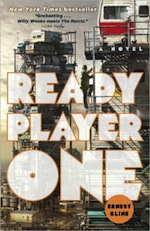 Part of why I love games so much is that independent of your background, you can excel with time and practice. I spent a lot of time moving around as a kid so that at every new school I attended, I was an outsider. The way I bonded with other students was talking about our favorite video games and how to beat them. That’s why I don’t like stories featuring young protagonists who are “chosen” as it’s less about them earning their victory and more about them being some arbitrary victor with innate skills. Wade, AKA Parzival, is by no means a chosen one. On the surface, he’s an outcast who doesn’t fit in. But he has a love for OASIS and all things Halliday, a devotion I could relate to. Ernest Cline has created an almost perfect mishmash of every awesome pop-culture phenomenon from the 80s, but brings his own unique sensibility to weave something not just inspiring, but genuinely addictive. I kept on wishing there was a real-world OASIS.
Part of why I love games so much is that independent of your background, you can excel with time and practice. I spent a lot of time moving around as a kid so that at every new school I attended, I was an outsider. The way I bonded with other students was talking about our favorite video games and how to beat them. That’s why I don’t like stories featuring young protagonists who are “chosen” as it’s less about them earning their victory and more about them being some arbitrary victor with innate skills. Wade, AKA Parzival, is by no means a chosen one. On the surface, he’s an outcast who doesn’t fit in. But he has a love for OASIS and all things Halliday, a devotion I could relate to. Ernest Cline has created an almost perfect mishmash of every awesome pop-culture phenomenon from the 80s, but brings his own unique sensibility to weave something not just inspiring, but genuinely addictive. I kept on wishing there was a real-world OASIS.
Things take a deadly turn when the corporation, IOI, gets serious about the egg hunt. They want to make OASIS an ad-flooded hell where everything is monetized- kind of the way our browsers would look without ad block x 1000. Is that worth killing for?
“The Game of Rat and Dragon” from The Best of Cordwainer Smith
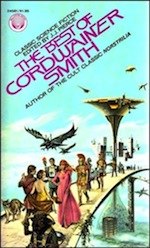 I’ve always wondered why Cordwainer Smith doesn’t get more attention. He was one of my favorite writers growing up, introduced to me by my high school AP English teacher. The stories of the Instrumentality, influenced by Smith’s time in China (whose godfather was Sun Yat-Sen), were unlike any other fiction I’d read. They were fueled by a strange imagination that melded outlandish science fiction with Asian myths, epitomized by this short story about pilots, “pin-lighters” who fight off mysterious entities they’ve coined dragons in the deep of space. Since humans by themselves are mentally too slow to tackle the dragons, they need a partner in the form of telepathic cats. These feline companions see it as a game, triggering a miniature nuclear bomb before the dragons can kill everyone on board. The Instrumentality, a government that acts like musical strings, is always present, looming, shaping history that unfortunately enough, often goes into discord. Of course, those are the best parts of the symphony.
I’ve always wondered why Cordwainer Smith doesn’t get more attention. He was one of my favorite writers growing up, introduced to me by my high school AP English teacher. The stories of the Instrumentality, influenced by Smith’s time in China (whose godfather was Sun Yat-Sen), were unlike any other fiction I’d read. They were fueled by a strange imagination that melded outlandish science fiction with Asian myths, epitomized by this short story about pilots, “pin-lighters” who fight off mysterious entities they’ve coined dragons in the deep of space. Since humans by themselves are mentally too slow to tackle the dragons, they need a partner in the form of telepathic cats. These feline companions see it as a game, triggering a miniature nuclear bomb before the dragons can kill everyone on board. The Instrumentality, a government that acts like musical strings, is always present, looming, shaping history that unfortunately enough, often goes into discord. Of course, those are the best parts of the symphony.
Romance of the Three Kingdoms by Luo Guanzhong
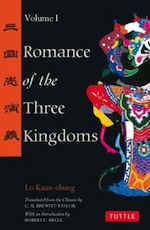 Arguably one of the most epic and grand novels ever written, Romance of the Three Kingdoms, based on actual history, is considered one of the four essential classics in China. I’ve read this massive series multiple times, played the games that were inspired by it (the simulation ones, not the beat em’ ups in the form of Dynasty Warriors), watched all the shows, read the 60-volume Manga inspired by it eight times, and been horrified by the terrible English translations.
Arguably one of the most epic and grand novels ever written, Romance of the Three Kingdoms, based on actual history, is considered one of the four essential classics in China. I’ve read this massive series multiple times, played the games that were inspired by it (the simulation ones, not the beat em’ ups in the form of Dynasty Warriors), watched all the shows, read the 60-volume Manga inspired by it eight times, and been horrified by the terrible English translations.
This example isn’t strictly a deadly game as it is one of the most gut-wrenching scenes involving a game I’ve ever read. General Guan Yu has won a crucial victory against the enemy, but been wounded by a poisoned arrow in the Battle of Fancheng. His surgeon, Hua Tuo, tells him he needs to have surgery to cut the venom out. As Guan Yu is in the middle of a game of weiqi AKA go (a Chinese game which made recent headlines when Google programmed an AI that could beat a weiqi professional), he insists the doctor perform the surgery right there. Guan Yu continues the game while the doctor cuts the flesh open, scrapes the poison off his bone, and even patches it. In the manga, it’s noted the doctor sweated more than Guan Yu. I’m curious how that scene would have played out if Guan Yu was playing against the so-called AlphaGo.
Bonus Round: The Book of Job
I spent a lot of time pondering the fate of Christianity if the Japanese Empire took over. In USJ, they incorporate it into their Shinto pantheon, which brings us to the Biblical Book of Job. If you take Job as fiction, it is one of the most provocative and poetic speculative works ever written. If fact, then the universe is a pretty scary place. God and Lucifer are wagering on a man’s life. Along the way, Job loses most of his family, his worldly possessions, and his health. His friends arrive and duly lecture him on being ungodly and sinful. Job resists them, scandalizing his friends who pontificate with fancy arguments. In the end, there are no answers, no resolution, just a literal deus ex machina as God doubles Job’s blessings after hundreds of questions. Theodicy, or the question of “why do the righteous suffer?” takes on an unnerving perspective from the viewpoint of a game between a creator and accuser. Good thing there’s a restart button.
Top image from Battle Royale (2000)
Peter Tieryas is the author of United States of Japan and has worked for game companies like LucasArts and EA. He likes tweeting about games at @TieryasXu.










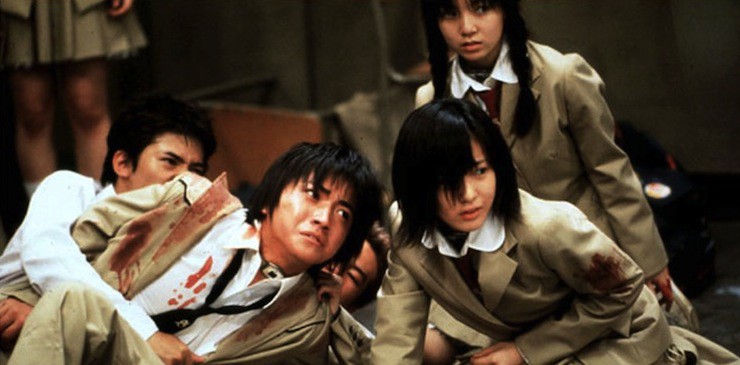
In SF, surely the most dangerous game of all is chess. Whether playing for the fate of humanity (against a unicorn, in a bar) in Roger Zelazny’s “Unicorn Variation”, improving your skill by sinister means in Fritz Leiber’s “Midnight by the Morphy Watch” or literally being a manipulated pawn in John Brunner’s The Squares of the City, a high Elo rating is essential for survival.
Piers Anthony did this quite a bit early on.
Split Infinity has the game playing world of Proton, twinned with the fantasy realm of Phaze.
Sos the Rope has the Battle Circle, a ritualised combat arena where men settle their disagreements in a post apocalyptic future.
Sheri S Tepper’s True Game realm starting with King’s Blood Four has the Gamesmen who regularly face off against each other in wars between Demesnes.
Do we count Ender’s Game?
Claire North’s recent trilogy of novellas “The Gameshouse” fits nicely into this. It deals with a mysterious gameshouse that appears in cities all over the world throughout history and draws the best players to it and pits them against each other in games of “chess” and “hide and seek” with the world as their board and spies, soldiers and politicians as their pieces.
Or you can go all the way back to Robert Sheckley’s <b>The Tenth Victim</b>, novelization of a movie based on his short story “The Seventh Victim.”
Hunger Games – as noted in the note to Battle Royale.
Kate Elliot’s Court of Fives – that has separately made these Tor lists.
Ron Weasley magical chess battle in Sorcerer’s Stone and the Tri-Wizard in book 4 of Harry Potter.
Completing the Pattern in Zelazny’s Amber series – guess you could call it a deadly game.
The slicing tree test in Rothfuss’s Wise Men Fear.
No doubt others will come to mind….
A short story, not a book, but Vonnegut’s “All the King’s Horses” is about a rather high-risk game of chess.
Wasn’t “deadly” per se, but a childhood favorite was Scott Corbett’s The Big Joke Game, about a mildly obnoxious kid who has to traverse a living board game.
And there’s always Jetan from Chessmen of Mars which is (unsurprisingly) a Barsoomian chess variant.
These are all great additions. Thanks all! Looking forward to checking them out =)
I don’t know if this neatly ties in or not, but one could conceive of the Lone Wolf books by Joe Dever, Gary Chalk et al to be books that ARE deadly games. The hefty portion of Book Seven, Castle Death, devoted to the maze would still represent a deadly game even if these books were novelized instead of interactive.
I’m glad to see a shout out to Cordwainer Smith. The Game of Rat and Dungeon is one of my favorite short stories ever. Games as a motif slip in more than once with him, you could have also nominated War No. 81-Q which involves very high stakes, although not death, except by accident.
I too love Cordwainer Smith. I shall have to go and reread …
Is there an English translation of Romance of the Three Kingdoms that you do find acceptable? I’ve read some conflicting things about them.
@@@@@willshakespeareforfood & @@@@@jazzlet:
Smith is a favorite and I often wonder why he doesn’t get more love. His short stories are unlike any, both back then and now. I liked War No. 81-Q, but since I could only pick one, chose Game of Rat and Dragon (similarly for Iain. M. Banks, I liked the virtual hell worlds in Surface Detail, but player of games was stronger overall. Also, the metamathematics the Minds of Excession spend eternities in). I still remember the first time I read Scanners Live In Vain and wondered if Smith was from another world =)
Hi @JeanTheSquare, I haven’t found a good translation of Three Kingdoms in English so far. All have strengths and weaknesses. But the English ones sound pretty stiff and seem more informational, losing the charm, character, and wit. If I do find one, I’ll let you know. I know it’s not impossible as I’ve found (in segments) decent translations of Journey to the West and Dream of Red Mansions (two of the other four essential classics) =)
Also of note for Iain M. Banks is “Damage”, the game played in Consider Phlebas… a card game where you lose one of your twelve lives if you don’t drop out of the hand and lose it. Except each life is an actual person who will really be killed. Oh, and the cards manipulate emotions and if you’re not careful can drive people to suicide.
@@@@@ghostly1 That’s right! I forgot about Damage. Thanks for pointing it out! =)
Poul Anderson did a short like Squares of the City with sentient pieces in a real game (The Immortal Game?).
There’s a story with the bad guy forcing a chess master to play garden chess with his family as the playing pieces to live or die by the game – so the chess master – spoiler space – plays a gambit.
There was a long ago story about winning the second game for the survival of the human race against not quite aliens. The only difference is septum IIRC?
There’s a story where the aliens have a lot in common with the human race and bring lots of social upgrades. The twist – spoiler space – has a mixed group duck hunting party refusing to shoot sitting ducks with the alien closing by saying “what a coincidence neither do we.”
What about Stephen King’s The Running Man?
@clarkemeyers- those are good ones! Thanks a bunch!
@basel gill – if you see my Battle Royale part, I made a note I left that one out, as much as I enjoyed both the book and the movie, because of similarities to BR (and I wanted more variety). Thanks though! =)
@17: The story in your third paragraph is Katherine MacLean and Charles V. de Vet’s “Second Game”, later expanded as Cosmic Checkmate.
Robert Heinlein’s ‘Tunnel in the Sky’ – teens undergoing a survival test on an alien planet get stranded.
How about Apirin’s Dragon Poker. That’ll get you in trouble. Maybe like c-list deadly though.
Perhaps not a game per se, but definitely a contest: The Long Walk, by Stephen King (as Bachman)
The game playing paradigm is pretty egotistical, of course, since it rarely considers the consequences to others. Job has that problem: his fate is bewailed, but no one seems to pay attention to his family that died horribly of a plague of boils, as I recall. I liked Banks’ _Player_ for that reason – part of what makes the story interesting is when Gurgeh does decide to care about consequences to others.
@24. No, Job was the one with boils. His kids were killed when a tornado dropped the house on them. The servants weren’t so lucky. Two groups were killed with swords and one group was burned alive.
Don’t forget “Now Inhale” by Eric Frank Russell.
In my English class we read a play with a similar take on the story of Job (I think it was called JB but for the life of me I can’t remember the playwright).
@@@@@Lisamarie Hi Lisamarie, is it this one? https://en.wikipedia.org/wiki/J.B._(play)
Yup, that was it!
I love the Smith, but including this story is a stretch; the cats see the hostiles as rats to be killed immediately (not, e.g., as mice to be played with.) Nobody is getting entertainment from this “game”; it’s the only thing making interstellar travel possible.
Elgin’s At the Seventh Level has poetry contests at many levels, including as a substitute for war; to make it harder, the poet has supporters who are struck down if the judges rule the poet’s verse was inadequate.
@17: I’m sure there are multiple versions of this story. I don’t remember the DeVet/MacLean (although I can picture the cover); I’d swear Vonnegut did this (specifically sacrificing a child to save the rest of the family) in one of the non-genre stories in Welcome to the Monkey House, but my copy has gone walkabout.